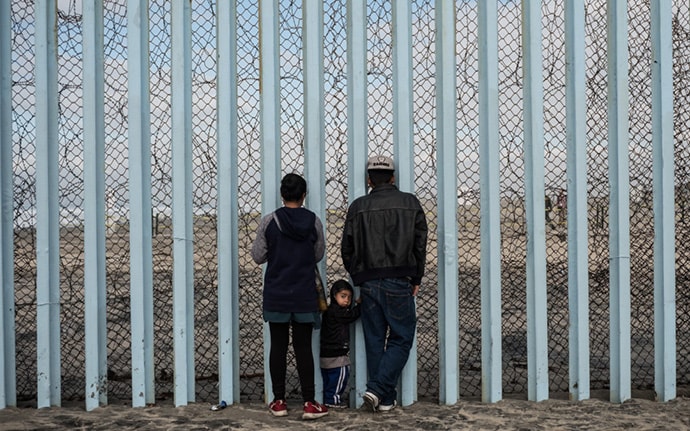Welcome to the October 2019 issue of the Global Washington newsletter.
IN THIS ISSUE
Letter from our Executive Director
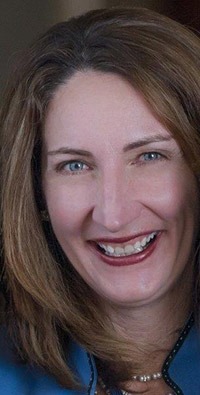
The new Goalkeepers Report from the Bill & Melinda Gates Foundation charts uplifting “stories of progress,” and I am inspired by the incredible advancements that have improved millions of peoples’ lives in developing countries. However, amidst all this progress, I was shocked to learn that global hunger is actually on the rise.
So why is food security such a difficult goal to achieve? For one thing, intertwined factors such as climate change, conflict, and economic instabilities have exacerbated the problem. This means that programs to address global hunger must be comprehensive and work at the nexus of all the Sustainable Development Goals.
Innovative agriculture solutions, such as those in development by Global Good, are part of the answer, and we profile some of them in this month’s newsletter. There are also a number of multi-sector partnerships that are making important headway. One is a new campaign called Stand for Her Land, jointly led by Landesa, which advocates for women’s land ownership as a way to help end poverty and hunger, as well as to advance gender equality.
Another collaboration worth learning more about is the Movement for Community-Led Development, an open collaboration facilitated by The Hunger Project. Several GlobalWA members are already part of this effort, including Mercy Corps, WaterAid, World Vision, and Heifer International.
In this issue, you will also find a profile of Heifer International President and CEO, Pierre Ferrari, whose childhood in the Belgian Congo greatly influenced his perspective on global development and food security. For more on this organization, I also encourage you to watch my video interview with Heifer International’s Chief of Mission Effectiveness, Hilary Haddigan.
I hope many of you can join us in person at our upcoming food security event on October 22 to learn more and be part of the conversation.
And if you haven’t already bought your tickets to the GlobalWA Goalmakers Conference coming up on November 15, I encourage you to do so. Last year’s conference sold out early, and trust me, you don’t want to miss this year’s event!

Kristen Dailey
Executive Director
Back to Top
Issue Brief
What will it take to end hunger globally?
By Joanne Lu
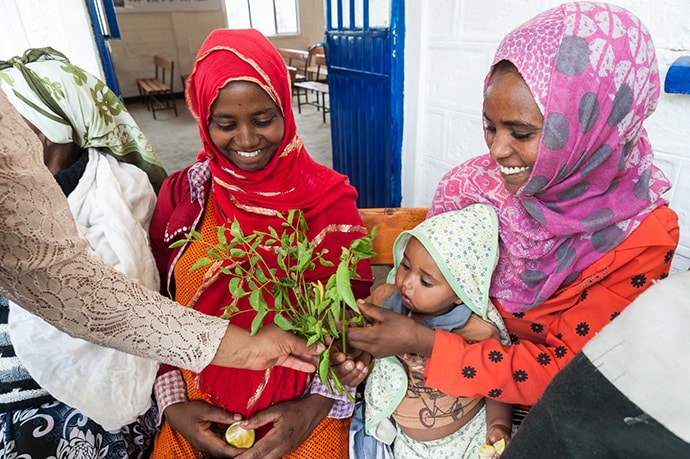
The Hunger Project trains volunteers in Ethiopia to educate their communities on the nutritional benefits of crops like moringa. Many people now grow the plant in their gardens.
Photo: Johannes Odé/The Hunger Project.
When the world narrowly missed its target in 2015 to halve the proportion of people suffering from hunger, we thought we were still on a steady trajectory toward eradication. Achieving zero hunger by 2030 would be ambitious, but with enough investment, it seemed feasible. Little did we imagine that last year would mark the third year in a row that global hunger has actually been on the rise.
The United Nations’ Sustainable Development Goal (SDG) 2 aims to “end hunger, achieve food security and improved nutrition and promote sustainable agriculture” by 2030. But as hunger refuses to fall amid conflict, climate challenges, and inequality, the global development community is increasingly recognizing that hunger is not just a technical problem – it is a human one. Ending hunger will require integrated action across a range of initiatives through strong global partnerships. After all, according to John Coonrod at The Hunger Project, hunger is tied to every SDG.
It should be alarming, then, that in 2018, nearly 11 percent of the world population – or about 822 million people – did not have enough to eat, according to this year’s State of Food Security and Nutrition in the World report by the UN Food and Agriculture Organization (FAO). That’s up from about 811 million the previous year, marking the third year of increase in a row.
In addition, more than 2 billion people, or 26 percent of the world, are food insecure, meaning they do not have regular access to enough safe and nutritious food. Although most of these people are in low- and middle-income countries, food insecurity is also affecting about 8 percent of people in North America and Europe.
Progress has also slowed when it comes to reducing the number of babies born underweight and halving the number of children who are stunted, according to the FAO report.
If the global rate of extreme poverty continues to decline – albeit slower now than before – why is hunger on the rise? According to the UN, the main drivers of global hunger right now are a combination of deadly protracted conflicts, climate variabilities and shocks, as well as economic slowdowns and downturns, coupled with inequality. These crises compound the effects of one another, destroying agricultural lands, productivity and infrastructure, killing livestock, forcing people from their homes, depleting communities’ abilities to cope and in some cases, restricting the access of humanitarians to deliver food and aid.
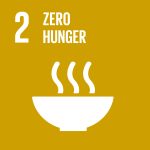
“All of this has led to major shifts in the way in which food is produced, distributed and consumed worldwide – and to new food security, nutrition and health challenges,” the heads of the FAO, the International Fund for Agricultural Development (IFAD), the UN Children’s Fund (UNICEF), the World Food Programme (WFP), and the World Health Organization (WHO) wrote in their joint foreword to the report.
To address these new challenges, the UN agency heads say it requires bolder action, “not only in scale but also in terms of multisectoral collaboration,” bringing food solutions together with agriculture, education, economic empowerment, gender issues, water and sanitation – all the SDGs. In essence, hunger and food security cannot be solved without the holistic development of communities, and vice versa.
That’s why it’s so exciting that Global Washington has members from across the development spectrum who are contributing to food security in innovative, sustainable, and integrated ways.
PeaceTrees Vietnam, for example, helps communities in Vietnam clear their land of dangerous explosives leftover from the war. In addition, they help the communities restore that land to safe use, including as productive farmland to feed their families and earn income. For one of the organization’s projects, about 60 farming families from two villages collaborated with wholesale spice companies to grow and supply black pepper. Along with startup materials to plant the vines, these families are learning pepper-farming skills, and the additional income will help reduce poverty over the long term.
In addition to creating opportunity and teaching better food production techniques, some organizations, like Pilgrim Africa, are also helping increase food security by investing in better tools and technology for smallholder farmers. Using machines to reduce their workload – such as diesel engines fitted with special attachments to pound cassava, for example – families, and especially women, can put more of their time toward other things, including education and building businesses. These agricultural technology investments are just one aspect of Pilgrim Africa’s multi-prong approach toward public health, education, and food security.
Global Good, an invention investment fund at Intellectual Ventures, is also leading the charge on developing innovations that increase food security for communities. For example, their solar-powered portable water pump system will help smallholder farmers access groundwater for their crops and livestock so they are not entirely dependent on rainfall. Other innovations help improve production yields, store crops for longer, increase access to markets, and ensure that food, including milk and livestock, are safe to consume.
Other holistic interventions require more than just training and technical innovations. In Central America and Mexico, for example, Agros is helping poor, rural families obtain land for their agricultural businesses, so they can eventually become economically self-sufficient. Experts then help families learn the technical skills they need and how to access market information to run a successful commercial farm. Agros also helps farmers improve their health and well-being, and provides financial literacy and education.
These types of holistic strategies are what the UN agency heads meant when they wrote in their joint foreword to the FAO report that we must foster “inclusive structural transformation” if we want to get on track to end hunger, food insecurity and malnutrition by 2030. They also wrote that we must place communities at the center of our work.
Empowering communities to lead their own development is at the heart of The Hunger Project’s (THP) holistic approach to ending hunger. That approach includes agriculture, food security, and nutrition, as well as education, clean water and sanitation, health, financial access, women’s empowerment, maternal health, community mobilization, and environment. Most important, all of the interventions are directed by the recipients themselves. THP begins by empowering women as change-agents in their community. After that, communities mobilize to build self-reliance. And finally THP helps communities forge effective partnerships with their local governments.
This bottom-up approach is also reflected in Heifer International’s work with farmers. Training and supporting smallholder farmers to achieve year-round availability and access to diverse and nutritious foods is only one of three prongs of its strategy to end hunger and poverty. The other two prongs are helping farmers increase their incomes and assets and promoting environmentally sustainable practices. Heifer believes that these three facets of its work only result in change at scale when combined with the empowerment of women and building social capital within a community.
Holistic, innovative, integrated and community-directed initiatives are the most effective way to improve food security and eliminate global hunger globally.
###
The following Global Washington members are working to improve food security around the world.
Agros International
Inspired by the teachings of Jesus, Agros International is a nonprofit organization that breaks the cycle of poverty and creates paths to prosperity for farming families in rural Latin America. Founded in 1984, Agros advances a holistic model of economic and social development through four key opportunity areas: land ownership, market-led agriculture, financial empowerment, and health & well-being. We tackle issues of food security by helping families start sustainable agribusinesses. These businesses allow them to grow their own food and increase their family income, making food security easier to attain. To date, Agros has partnered with 43 rural communities in El Salvador, Guatemala, Honduras, Mexico, and Nicaragua, impacting the lives of over 12,000 people.
CARE
CARE is a leading humanitarian organization fighting global poverty, working in 93 countries to improve the lives of millions of people through programs which improve access to education, health care and economic opportunities. Since sending the first CARE Package® in 1946, we’ve worked with governments and communities to ensure sustainable food security for the world’s poorest people. CARE’s food and nutrition security work includes working with small farmers to increase productivity, access markets and build resilience to climate change and ensure the good nutrition of their families. In emergency contexts, CARE provides cash vouchers so families can purchase food from local markets and CARE provides nutritional supplements for children who are suffering from malnutrition.
Earthworm
Earthworm Foundation is a global non-profit organization that works to make value chains an engine of prosperity for communities and ecosystems. Active in key commodity producing regions around the world, Earthworm collaborates with diverse stakeholders, including companies, communities, and workers to ensure that commodity sourcing and production does not negatively impact community rights and livelihoods, environmental values, or workers. Earthworm’s efforts to protect and enhance food security include initiatives focused on farmer livelihoods, healthy soils, capacity building in companies, and responsible plantation development. Its Rurality program promotes better smallholder farming practices and crop diversification with the goals of ensuring that farmer households have resilient livelihoods and access to a variety of food crops for their own consumption. At the corporate boardroom-level, Earthworm engages with company leaders to establish values-driven, responsible sourcing policies, map their supply chains, and support farmers on issues such as food security for their regions.
Global Good
Global Good combines Intellectual Venture’s unique invention prowess with the expertise of leading humanitarian organizations, forward-looking governments, and commercial partners. The organization invents, develops, and deploys commercially-viable technologies that improve life in developing countries. In its global development portfolio, Global Good has created an affordable and robust grain moisture measurement meter that is expected to launch in 2020. Awareness of moisture levels in grains and grain legumes can help farmers predict and prevent fungal growth, thereby reducing the likelihood of toxin deposition, nutrition detriment, and other effects of spoilage. It can also enable farmers to make more informed decisions on the best methods for crop drying and storage, as well as timing the sale of their crops.
Heifer International
Heifer International is a global development organization on a mission to end hunger and poverty in a sustainable way. The organization works with communities in 21 countries around the world to strengthen local economies and build secure livelihoods that guarantee a living income to small-scale farmers. Since Heifer was founded in 1944, it has supported 35 million families to lift themselves out of hunger and poverty. Heifer’s model focuses on increasing income and assets within farming families, improving their food security and nutrition, and protecting the environment – with women’s empowerment and connected communities at the very center. Heifer strengthens local farmer organizations – helping to set them up where they don’t already exist – and provides livestock and seeds, which serve as important sources of food and income. As their farms expand, Heifer connects farmers to markets and helps them develop the production experience and expertise to make their businesses thrive and grow.
The Hunger Project
The Hunger Project is an organization committed to the sustainable end of world hunger. It implements pioneering, gender-focused, community-led programs to address the root causes of hunger in Africa, Asia, and Latin America and advocates for the widespread adoption of these approaches in countries throughout the world.
Landesa
Landesa champions and works to secure land rights for millions of the world’s poorest communities, primarily rural women and men, to promote social justice and provide opportunity. Equipped with secure land rights, rural communities have both the incentive and the opportunity to make long-term investments that conserve soil and water, boost agricultural productivity, and lay the foundation for a food secure future. Because Landesa works with national governments to develop more effective land laws, its work has the potential to impact millions. For more than 50 years, working in more than 50 countries, Landesa has helped strengthen land rights for more than 180 million families.
Mercy Corps
Mercy Corps is a leading global organization powered by the belief that a better world is possible. The organization helps people in the midst of humanitarian crisis meet their most urgent food needs and also works to build long-term food security, partnering with the most vulnerable communities to develop comprehensive, integrated programs, driven by local needs and market conditions. Last year, Mercy Corps provided urgently needed food to more than 1.4 million people in some of the most hard-to-reach areas of the world. Beyond meeting urgent hunger needs, Mercy Corps improves access to sustainable sources of affordable and nutritious food, encourages farmers to produce nutritious crops and healthy livestock, and provides nutrition education to promote healthy and diverse diets. Last year, Mercy Corps connected more than 1.1 million farmers to the resources they need to increase their production, feed their families and boost their incomes.
One Equal Heart
One Equal Heart is a non-profit organization that tackles the root causes of food insecurity by connecting indigenous communities in Chiapas, Mexico, with tools to thrive. Projects work holistically to honor and nurture sustainable agriculture, build equitable communities and promote traditional knowledge. With a special focus on engaging indigenous women and youth as catalysts for change, project participants learn skills to grow food ecologically, sell surplus products in local markets, manage earnings through community savings and credit cooperatives, and start kitchen businesses. Founded in 2006, One Equal Heart leverages project resources by working with organizations based in Mexico to build capacities of indigenous communities so they can drive their own development from the ground up!
Oxfam
Oxfam believes that empowering small-scale farmers—particularly women—is essential to fighting poverty, hunger, and food insecurity. Helping small-scale farmers to be more productive can lift their families out of poverty and end the cycle of food insecurity that threatens communities and whole nations. It can generate income that families can invest in their children, and it can sow the seeds of economic development. Secure land tenure, appropriate technology, strong and democratic institutions, and policies that are fair to smallholders can make all the difference. Through focused and targeted advocacy, Oxfam also tackles the underlying policies and power imbalances that keep people in poverty. For example, through the GROW campaign, Oxfam supporters and allies have made significant progress in reforming a broken food system through a variety of actions and campaigning tactics, including evidence-based reports, direct lobbying of governments, mobilizing for marches, sponsoring petitions, using social media, and building coalitions.
PeaceTrees Vietnam
PeaceTrees Vietnam creates a safe and successful future for children and families endangered by the legacy of the Vietnam War. In partnership with communities in central Vietnam PeaceTrees removes explosives and returns land to productive use, builds schools and libraries to educate future generations, and advances economic development to ensure a prosperous tomorrow. Through childhood nutrition, mine risk education, and sustainable agricultural programs, PeaceTrees helps cultivate secure, resilient and flourishing communities in a country still ravaged by the remnants of war.
Pilgrim Africa
Pilgrim Africa’s mission is to challenge despair, love boldly, and help African people create a future of prosperity and health. It aims to restore the hope and dignity found in Christ to those devastated by war, poverty, or disease. When it comes to food security, Pilgrim Africa invests in technology that reduces the day-to-day workload of people in agricultural communities, especially women. For those families in desperate need of short-term solutions, especially in times of war or famine, Pilgrim Africa has a long history of providing aid. In early 2017 when drought caused crops to fail in Teso, Pilgrim Africa provided rice to ward off starvation. When the rains returned, the organization provided vegetable starts so that farmers could have a second chance at a harvest.
World Concern
World Concern is a Christian humanitarian organization dedicated to transformational development in the most impoverished and overlooked places of the world. The organization goes beyond the end of the road, partnering with communities to meet the needs they prioritize, and empowering them to make lasting changes. World Concern works in 15 countries in Africa, Asia, the Middle East, and Haiti, providing clean water, sustainable food sources, child protection, economic empowerment, disaster response, and spiritual transformation. Its focus on food security includes emergency nutrition for malnourished children, training in long-term sustainable food production through agricultural training and tools, livestock and livelihood diversification, and peer-to-peer training in pre-natal and child nutrition.
World Vision
World Vision is a Christian humanitarian organization dedicated to working with children, families, and their communities worldwide to reach their full potential by tackling the root causes of poverty and injustice. One of World Vision’s largest partners is the UN World Food Program (WFP). World Vision partners with WFP in 63 projects in 18 countries to support immediate food security needs of vulnerable populations through food, cash, and voucher assistance as well as mid-term needs through nutrition monitoring and agricultural support.
Back to Top
Organization Profile
Could a movement for community-led development help end global hunger? The Hunger Project plans to find out
By Joanne Lu
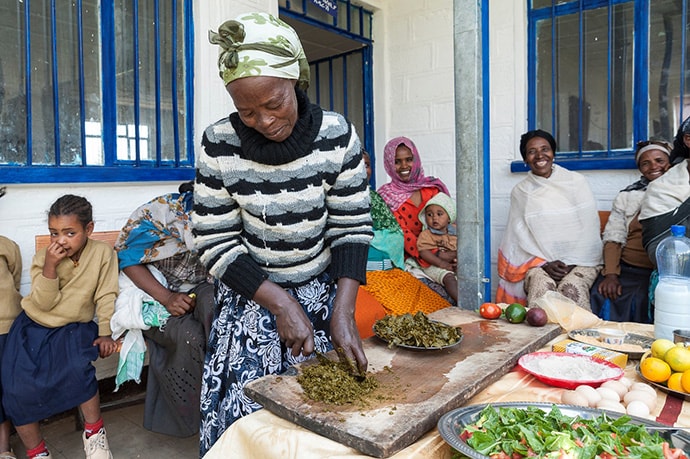
The Hunger Project trains volunteers to educate their communities on the nutritional benefits of crops like moringa. This approach has led to strong adoption and community-ownership. For example, many people who have used moringa to nourish their children, now grow the plant in their gardens and sell its byproducts to their neighbors. Photo: Johannes Odé/THP.
Since 1977, The Hunger Project (THP) has been on a mission to end hunger, not just alleviate it. But over the decades, the organization has developed a profound conviction that it cannot accomplish this mission alone. In fact, THP believes that the end of hunger can only be achieved with the active participation – make that at the direction – of those who are hungry.
When THP was launched in the wake of the devastating 1974 Bangladesh famine, its founders wanted to raise awareness and political will in order to end global hunger. Now, over four decades later, the goal has not changed, but the work has evolved far beyond advocacy to on-the-ground programs in 22 countries that empower people – especially women – to end their own hunger.
By hunger, THP means “chronic, persistent hunger,” not just acute famines like the one that inspired the organization’s creation. And this chronic, persistent hunger requires more than just food to tackle, because, as THP’s executive vice president, John Coonrod, says, “Hunger is a human issue – not just a financial or a technical issue.”
Hunger, according to THP, is at the center of a nexus of interlinked issues, including poverty, nutrition, agriculture and food security, clean water and sanitation, education, health, women’s empowerment, financial literacy and access, peace, climate, and the environment. You might recognize these as many of the UN’s Sustainable Development Goals (SDGs). In the same way that most experts now recognize that to achieve any one SDG requires progress towards all of them, THP believes that these interlinked issues need to be addressed at the same time within a community in order to end hunger. Throwing more money into relief efforts or trying to develop a silver bullet technical solution will always fall short, says Coonrod.
But for all the talk of no singular solution, THP does believe there is a key element to ending hunger that cannot be compromised. While the prevailing mindset treats hungry people as passive recipients of aid, THP believes that hungry people must be key actors in their own development. This is a fundamental right of every woman and man, says Coonrod. Without strengthening individuals, communities and governments at the local level, basic needs will be overlooked.
This is in line with the principle of “subsidiarity,” which states that matters should be addressed at the lowest level of authority possible for them to be addressed adequately. For example, local governments can and should be responsible for water and sanitation, while states and provinces would be better suited to maintain roads. But who’s in the best position to protect equal rights for all? That would be national governments. In theory, this principle upholds the right and dignity of individuals to accomplish as much as they can with their own initiative and effort.
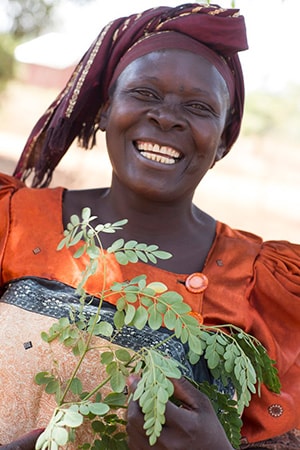
To empower people to take charge of their own development, THP spends five to eight years, working with communities to build their confidence, equip women as key change agents, strengthen their institutions, and foster partnerships with local governments for long-lasting change. Photo: Rebke Klokke/THP.
But in the contexts where THP works, people are used to being resigned and dependent on top-down aid and decision-making. They’re convinced that poverty is their destiny. To empower people to take charge of their own development, THP spends five to eight years, working with communities to build their confidence, equip women as key change agents, strengthen their institutions and foster partnerships with local governments for long-lasting change.
For many years, THP thought they were alone in this bottom-up model of development. But in 2015, as the UN wrapped up its Millennium Development Goals and prepared to launch its new set of 17 Sustainable Development Goals, THP began to engage in conversations with other organizations that, it turns out, also believed strongly in community-led development strategies. However, without a platform, network, or common language, these organizations – including some of the biggest players in development – also felt isolated and alone in their efforts to reverse the top-down model.
On September 25, 2015, the same day that the UN introduced the SDGs, 18 international development organizations launched the Movement for Community-led Development. Since then, the movement has brought together 64 organizations that are working in all different sectors of global development, but are all publicly committed to expanding inclusive, gender-focused, community-led development into every country where it’s needed. This not only means committing to the approach in their own work, but also taking it to scale by working with grassroots-level governments to build the capacity of communities.
Although far more organizations have jumped onboard the movement than THP could have initially imagined, Coonrod says that turning the tide across the development industry is still slow and difficult work. Individual countries, such as Kenya, Zambia, and Malawi, are gradually adopting policies to devolve power to the county level, and some agencies (like USAID and the World Bank) are taking incremental steps toward locally-driven development programs.
However, there is still significant work to do to educate large foundations about how community-led development can support their signature programs and how it can enhance the sustainability of their investments.
The movement so far includes a wide variety of organizations, including Heifer International, Mercy Corps, BRAC, Catholic Relief Services, WaterAid, and World Vision, just to name a few.
And while funding streams for community-led development have been slow to appear, there is one belief that binds the coalition and makes it work.
“We know this approach is on the right side of history,” says Coonrod. “All human beings are born free and equal in dignity and with rights, including the right to food, health, work and education. People are inherently creative, resourceful, self-reliant, responsible and productive. We must not treat people living in conditions of hunger as beneficiaries, which can crush their dignity, but rather as the key resource for ending hunger.”
Back to Top
Goalmaker
Values and value chains: Pierre Ferrari reflects on how his childhood shaped his approach to global development
By Amber Cortes
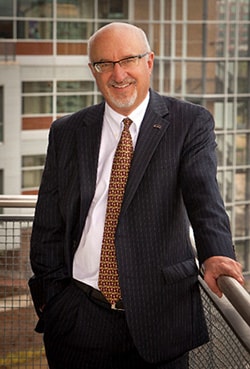 Growing up, Pierre Ferrari felt like he was living two lives.
Growing up, Pierre Ferrari felt like he was living two lives.
“One is the colonial elite prestige life, and being protected, and having servants. And the other, of course, is the reality of where you live,” he says.
As a child, the now President and CEO of Heifer International grew up in the Belgian Congo and Kenya. Ferrari was educated in Catholic schools, where teachers stressed awareness of social justice issues. His grandmother, a pious Catholic, got involved with helping villages where the diocese had schools for the Congolese. She helped them put together a business where the villagers sold their surplus vegetables to retailers.
“I went with her many times to the village to collect vegetables. I remember going with her in a Ford truck, down those dirt roads, to go get the vegetables and pack them up,” he says.
Ferrari’s grandmother acted as a sort of wholesaler, helping the villagers get their goods to market.
“I was definitely old enough to get it. This wasn’t charity, this was commerce,” Ferrari says.
This early experience set the stage for his later work with Heifer International, a 75-year-old organization that works with communities to promote food security, economic stability and sustainability by helping develop agricultural resources, and providing training to small-scale farmers, communities, and villages across the world.
“I’ve always wondered,” Ferrari says, “whether or not that experience with my grandmother was actually part of the inspiration of what we’re doing now at Heifer.”
The American Dream—Reimagined
Educated in boarding schools in England, Ferrari eventually attended Cambridge University, where he studied economics. After earning his master’s, Ferrari had to make some decisions about what he wanted to do (and where he wanted to be) in his life.
“I didn’t think England was my country. I mean, it’s the place where I got educated. But I said to myself, where am I going to make my future? And I decided to follow the American dream. To chase the American dream. So, I immigrated here and ended up at Harvard Business School, and then took a job with Coca-Cola.”
What could be more American than working for Coca-Cola, the iconic American brand? But even though Ferrari spent almost twenty years there, eventually becoming senior vice president of marketing, he wasn’t satisfied with corporate life.
“There’s a stability, and there’s a coherence about the way corporations do what they do. But if you are ambitious at all, it’s all about money. It’s about making more money and a lot of money!”
Ferrari wasn’t interested in making a ton of money; he wanted to help people. So he made a career pivot into the non-profit world. He soon learned that after the fast-paced environment of Coca-Cola, the large-scale NGO world felt slow and overly bureaucratic. After three years at CARE, he took a different course.
“I did a whole bunch of different things. My wife called it the dim sum life— these small plates that keep coming, and you just sample out of them.”
He started a small venture fund to invest in companies benefitting disadvantaged communities — “before impact investment was all the rage,” he adds. “I invested in five companies—three went bankrupt, two are successful today—which is good!”
Then, an opportunity with Heifer came up. His wife urged him to take the job, suggesting it might be time to do something with a larger impact.
“And especially in a leadership position, which it was. And so I did—I jumped from the dim sum life to the steak life!”
Different Stakeholder, New Value Chains
One big difference between the corporate and the non-profit world, Ferrari says, is that you’re dealing with communities, not products. This awareness needs to inform everything you do, from engaging partners, to communicating with donors, to even rolling with changes and setbacks as they happen.
“Change is a much more dynamic, organic mechanism than I think businesses, or even donors, know.”
One mistake, Ferrari says, is when NGOs go into communities and design projects that are four or five years in duration with the goal of some kind of social or economic impact.
“And that’s just a straight up mistake. It takes more time, especially if you are looking for substantive change, systemic change. And you’ve got to be prepared that it might take 10 years or more, and you’ve just got to keep integrating the new learnings and changing your goals.”
The investment of time is one component of Heifer’s work with communities in deep poverty. The other is psychological. Before the first agricultural or economic steps are taken, there’s a process that begins with transforming people’s worldview, Ferrari says, into one “that is more hopeful than despair.”
The process is part of Heifer’s set of guiding principles known as Values-Based Holistic Community Development, which focuses on developing collective strengths to achieve community transformation.
“And that happens, it actually happens. Especially among women, who are much more open to that kind of change. And you know, just realizing that they have assets together, that it’s not just an individual change, but it’s all a collective, a village change, a community change.”
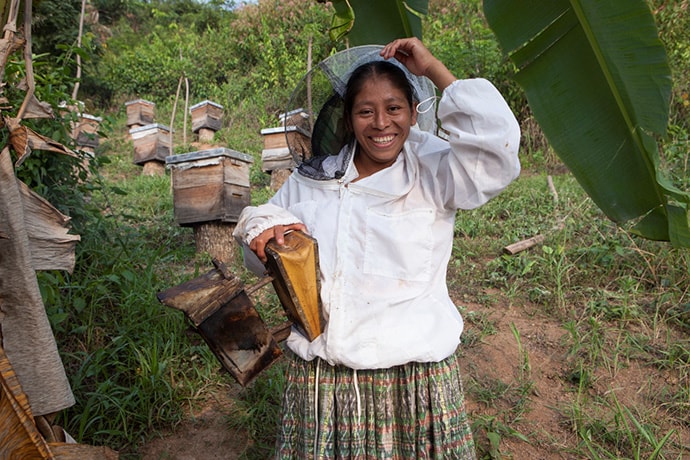
Estela Botzoc Tiul prepares to gather honey from her beehives. She is part of a Heifer project supporting communities in Guatemala to increase incomes, while protecting the environment. Photo: Russell Powell/Heifer International.
Ferrari applies his knowledge of economics and systems thinking towards creating alternative economic paths, or “pro-poor wealth creating value chains.” This approach invites people who are often at the root of a particular economic chain, like farmers, and brings them into alternate markets—in a way that is empowering and equitable, not exploitative or extractive.
“It’s a value chain that recognizes that the poor can actually make a living income. We’ve got this goal in mind with every community we work with.”
For example, Guatemala is the largest exporter of cardamom spice in the world, but the processing and the exporting are concentrated within a handful of families in Guatemala who exploit the farmers growing the spice. Heifer wanted to find a different set of stakeholders, not the ones that have a commitment to the existing—exploitative— system that they benefit from.
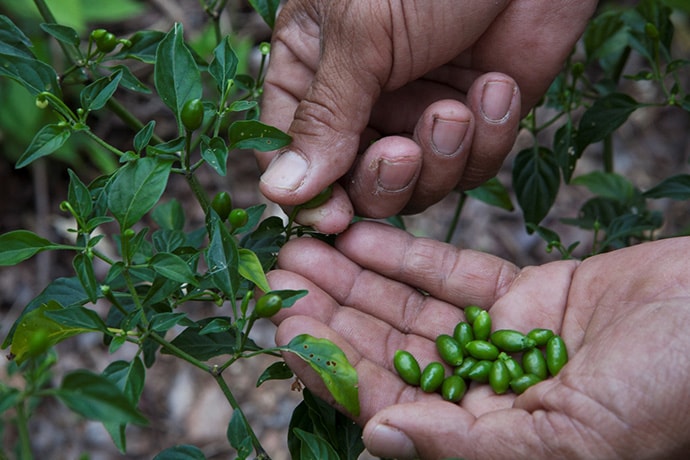
A farmer harvests cardamom from his plants in Senahú village, Guatemala. Photo: Russell Powell/Heifer International.
To that end, Heifer became involved in every part of the Guatemalan cardamom economic chain—from growth to market. That has meant collaborating with research teams at universities in the U.S. and Guatemala to help ward off destructive pests that can damage crops, to building drying plants for the spice, to working with the government to finding a spice vendor in Tennessee who wants to buy directly from the farmers.
“We have found a way to get high quality cardamom to market in a very different way, with a different group of players—stakeholders who are going to participate in this new value chain that we’ve created,” he explains.
Ferrari says the key to making these alliances with various stakeholders’ work is to be upfront about everyone’s benefits and incentives.
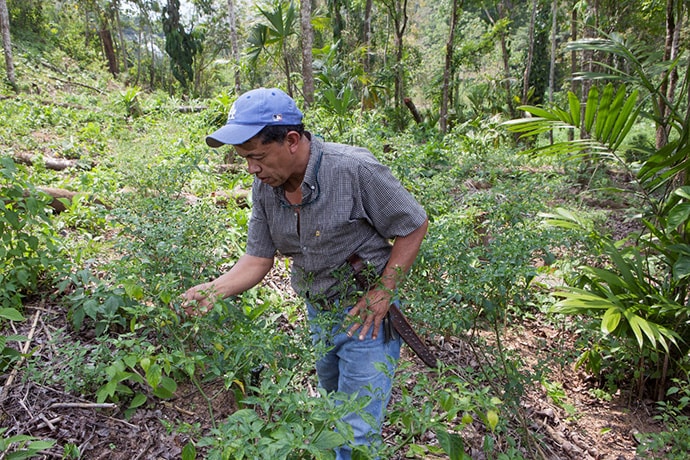
Filiberto Choc inspects his cardamom plants in a field near his home in Senahú village, Guatemala. He is part of a Heifer project supporting communities in Guatemala to increase incomes, while protecting the environment. Photo: Russell Powell/Heifer International.
“It really is the hardest work I do”
There is another crucial component to forming lasting partnerships and building social change. It’s to examine how these exploitative economic chains work—and one’s own role in them, as well. Ferrari did just that when he questioned whether Heifer’s work with large coffee companies that were profiting off farmers made them potentially (though unintentionally) complicit in exploiting them and pushing them further into poverty.
“We’ve got to talk about our potential complicity in various systems. We want to change the system, we’ve been wanting to do that for a long time and continue to do that. But this is about a different component to it – where we are participating in some way implicitly, in the exploitation that’s going on.”
This kind of thinking must come from the leadership, Ferrari says, who should take the time “to reflect on what impact they’re having on the world. What are your values and motivation, and what are you in this for?”
This reflection, Ferrari says, examining privilege, complicity, and power, is immensely challenging—but necessary.
“It’s hard work,” he says. “It really is the hardest work I do.”
Back to Top
Innovation Spotlight
Technology solutions that Global Good is developing for smallholder farmers aim to reduce poverty and improve health across the board
By Andie Long
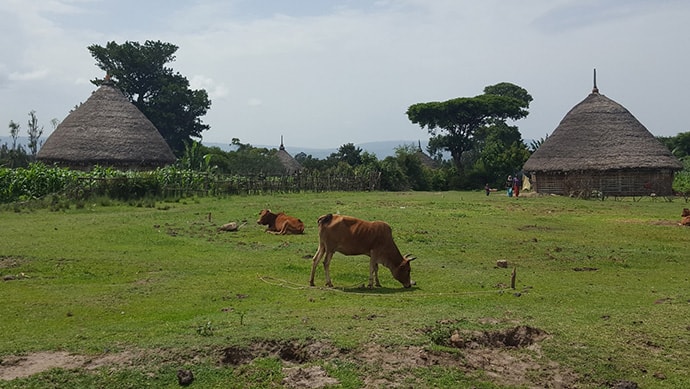
Photo: Global Good.
When they think of an innovator, many people imagine an individual, toiling away alone in a laboratory, coming up with ideas the world has never seen. In reality, most innovation arises from people collaborating and combining their insights to solve problems in new ways, where new ideas build on existing ones.
Marie Connett, who directs the Global Development Technologies portfolio at Global Good, an invention investment fund at Intellectual Ventures, firmly believes collaboration can help transform the food system for a sustainable future.
A healthy portion of technologies that Global Good develops pertain to agriculture because, according to Dr. Connett, agriculture has been shown by multiple studies to be one of the most effective sectors for intervention, for both poverty alleviation and the health of the planet.
“Done well, agriculture can feed everyone,” she said. “Done poorly, it can cause long-lasting damage.”
For example, if people aren’t getting enough food, or the right kinds of food, that has an impact on their health and wellness. Further, if food products aren’t reaching the markets intact, or if producers aren’t receiving a fair price for their product, they may be less able to work their way out of poverty.
True innovators, Connett and her team often look for ways to build on some of the really great ideas that are already available to the big agriculture market – then they work to make products that are more affordable and better adapted to the needs of smallholder farmers.
Global Good believes at its core that inventions designed for some of the most challenging situations faced by the poor will eventually prove disruptive to the broader global community, providing many more benefits beyond the initial use case for which they were designed. Global Good calls this phenomenon reverse innovation.
For instance, in many parts of Africa there is plenty of groundwater near the surface of the soil, but it’s often not accessible to smallholder farmers who can’t afford to purchase expensive pumps to reach it. So although the rain falls equally on rich and poor farmers, only the poor farmers are totally dependent on rainfall to water their crops. This puts them in a precarious position if the rains come at the wrong time, or fail to come at all.
Adding to the challenges, smallholder farmers often do not own the land that they farm. This means that even if they were to find the money to install a fixed pumping system to reach the groundwater beneath their feet, the landowner could demand more in rent the next year – because the pump would have increased the land’s value!
To solve this dilemma, Global Good is developing a solar powered portable pump system at a price point that allows farmers to recoup their investment in under 18 months. They are also exploring Irrigation-As-A-Service, using an innovative motorcycle-powered water pump. Operating a mobile water pump service could provide additional income to individuals who own motorcycles, and it would benefit farmers willing to pay for crop irrigation services without having to make their own capital investment in a traditional pump.
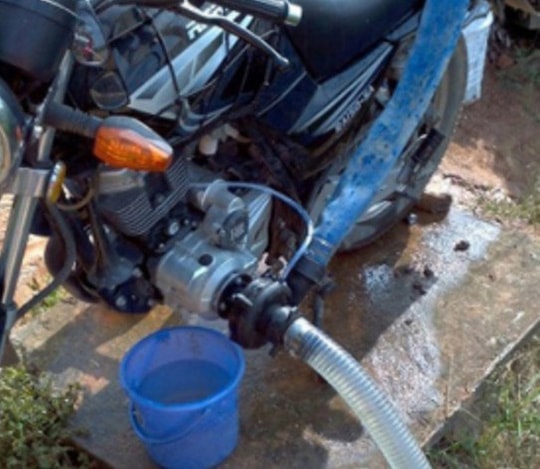
This irrigation pump utilizes readily available motorcycle engine power. Photo: Global Good.
It is often the case that smallholder farmers have relocated to a new region as a result of natural disasters, conflict, or other reasons. So in addition to managing rain-fed irrigation challenges, many smallholder farmers are not familiar with the particular piece of land they farm. Knowing when to plant, or even what varieties of crops to cultivate can be difficult. And even for farmers who know their land and local weather patterns well, a bigger challenge that smallholder farmers face is climate change.
“There are ample reasons to be deeply concerned” about helping smallholder farmers adapt to climate changes, Connett says. Despite the highly vaunted Green Revolution, which increased crop yields globally by promoting uniform production and other efficiencies, Connett notes that climate unpredictability quickly “out-games” these approaches.
In turn, most of the tools that Connett’s team is developing will help enable farmers in “normal” conditions and also increase their options in response to increasingly unpredictable weather.
When it comes to options, breeding drought resistant seeds may sound great, Connett explained, but there are usually tradeoffs in terms of productivity and cost. For example, if one year is particularly wet and the next year is dry, a farmer would not want to pay more for drought-resistant seeds during the wet year, when she could have increased her crop yield (and saved money) by buying the regular variety of seeds.
“If we can think of interventions that enable the farmers to make choices, depending on their situations, we’re going to be more empowering than if we try to layer on complete solutions to meet a particular need,” Connett said.
In addition to finding ways to make groundwater more accessible and affordable to smallholder farmers, Global Good also looks at better options for farmers to dry their grain cheaply. Grains can be spoiled by excessive moisture, and in places where farmers depend on the sun for drying the harvest, one heavy rainy season or unseasonably early rainfall can destroy all their hard work.
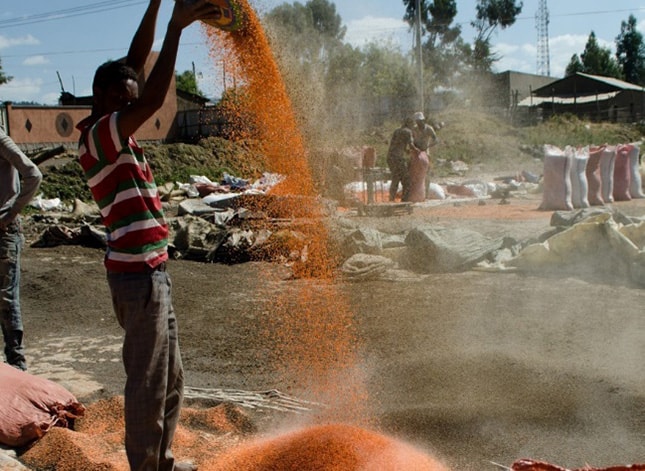
Solar drying methods for grains and legumes are helpful but limited by weather dependency. Photo: Global Good.
One of the products Connett is most excited about right now is a moisture meter for crops. Often farmers are paid by the weight of their crop, but if the grains or legumes are considered to be even a little too wet, the purchaser will deduct part of the price, ostensibly because they will have to expend energy to dry it out before they can sell it. On the other hand, if the crop that a farmer is selling has been excessively dried, the weight of that crop will be lower (because there is less moisture content), and thus, the farmers will again receive less money.
Global Good reasons that if farmers know how wet their crop is, they will have a better handle on when it would be desirable to sell it. The moisture meter would also help farmers determine whether the crop could be at risk of spoilage.
Global Good already has a commercialization partner and a manufacturing partner in place for the moisture meter, and Connett hopes they will be able to launch the product next year.
One of the advantages that Global Good has in being managed by Intellectual Ventures is that the organization as a whole is good at documenting new intellectual property created when products are developed. This can provide leverage once a commercial partner has been identified in the market. In return for a license to make and sell a product, partners must agree to make the product available to lower income customers at an affordable price. There are profits to be made at all levels of the market, but if the partner fails to reach the target market, Global Good can rescind the right to use its intellectual property. This “carrot and stick” approach serves it well, Connett said.
In looking at what challenges Global Good might try to solve next, Connett sees a great deal of opportunity in helping smallholder farmers access information about the local weather in order to make educated decisions about the harvest cycle.
In addition, Connett notes that financial mechanisms conducive to agricultural cycles are sorely needed in many places. Farmers need loans to come due only after the harvest comes in, not before.
And finally, storage solutions that can prevent crop spoilage while farmers are waiting for market conditions to improve would go a long way toward improving their financial health. And having safely stored grains and legumes would help improve human and animal health, as well.
Back to Top
Partnership Highlight
A new multi-stakeholder campaign, Stand for Her Land, advocates for women’s land rights – and the implementation of those rights
By Amber Cortes
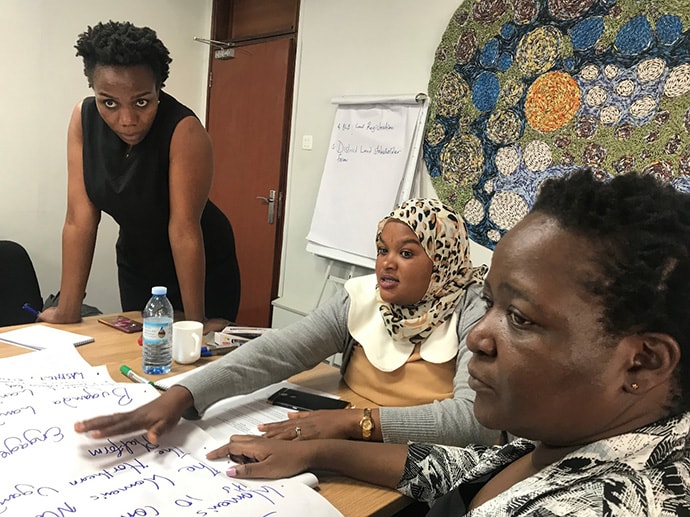
At the first Stand For Her Land convening in Uganda in early October 2019, 20 civil society groups, representing a diverse cross section of issues, brainstorm ideas for a future campaign. Photo: Jennifer Abrahamson/Landesa.
There’s nothing like that “new partnership” feeling—ideas are flowing, plans are being made, and big goals are being put into place. Collective action, especially in global development work, can be an exciting—but also daunting—adventure. Especially when developing dynamic, responsive relationships, where collective action can help build a larger, more powerful platform for change, like in the new campaign, Stand for Her Land.
Stand for Her Land is a global joint collaborative effort of several NGOs working together with local coalitions to advocate for women’s land rights. The campaign draws upon the strength of previous efforts of activists, advocacy and civil society groups, who were successful in getting countries to pass new laws that protect land rights for women, particularly in the form of inheritance.
But it’s been hard to get the word out, and there are gaps in knowledge and communication—brought on by both lack of awareness, and discrimination—that are preventing women, half the world’s population, from accessing land. (Right now women only own 20% of the world’s land). The Stand for Her Land campaign wants to close the gap between the letter of the law, and its practice in reality—to help guarantee women’s equal rights to property and economic security.
“These new laws and the policies are a tremendous first step,” explains Jennifer Abrahamson, Chief of Advocacy & Communications at Landesa, one of the global partners in the campaign. “And it’s thanks to the people who live and breathe these issues in their own country, day to day, that they exist,” she adds.
“But we felt collectively as a group of global organizations—along down the line from the grassroots up to the multilateral—that there was a need for a collective push to begin closing that stubborn gap for good. The laws are really only as good as their implementation at the end of the day.”
Landesa is one of five core partners in the campaign, including the Global Land Tool Network , Habitat for Humanity, the Huairou Commission, and the World Bank. Together, these partners form a steering committee that aims to provide resources and advocacy tools for local groups working on land rights issues in their country. The campaign is just getting started—right now the steering committee is doing everything from planning events, finding funders, setting up systems, building relationships with potential country coalitions, and playing a facilitator role to the launch of Stand for Her Land’s first pilot country: Tanzania.
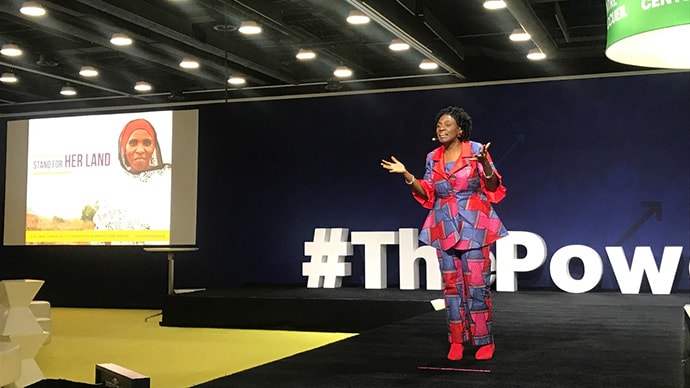
Monica Mhoja, director of Landesa’s Tanzania program and head of the Stand For Her Land Campaign coalition in Tanzania, speaks about the campaign at the Women Deliver conference in Vancouver, Canada, in June 2019. Photo: Jennifer Abrahamson/Landesa.
We see the global campaign as an umbrella, working in service to the real change makers, who are going to be the beating hearts of the campaign—the country-based coalitions largely comprised of local, civil society groups.”
Abrahamson hopes these groups — who come from diverse backgrounds in social justice work, food security, and poverty alleviation—continue to build intersectional relationships that move the conversation forward. That’s because land rights, and women’s land rights in particular, are interconnected with, and key to improving, so many other issues that start with the agency that women have over their property, their lives, and their families.
When women own property, Abrahamson explains, their decision-making power increases.
“They have more control over how the household income is spent, what crop the family is going to grow and where, how much everyone is going to work and contribute. That decision-making power leads to improvements in health, food security, nutrition, and agricultural production.”
The result is a ripple effect that benefits not just families, but entire communities.
“They invest back into the family’s health, their children’s nutrition and wellbeing, and invest in their education and future,” Abrahamson says. It is a long-term vision that takes time to develop, which is why the most ambitious goals for this new campaign are aligned around the UN’s Sustainable Development Goals of ending poverty and hunger, as well as advancing gender equality by the year 2030.
In order to complete their long-term vision, the Stand for Her Land campaign’s strategic partnerships are meant to uncover shared strategies, as well as to craft toolkits that can be adapted and deployed to different contexts, and shared across multiple geographies, traditions, and cultures. And everyone needed to bring something unique to the table.
For example, Landesa’s experience is deeply rooted in rural areas and farming communities around the world, whereas Habitat for Humanity’s focus is broader, with a particularly strong expertise in urban areas.
With so many different partners involved in this campaign, from international NGOs to local advocacy groups, it ends up being a pretty big table. How can consensus be reached with so many potential stakeholders?
“I think that’s really, really important that we keep the voices consolidated. So, there’s one person, for the most part, maybe two, who participate from each organization in the steering committee and make decisions on how we’re going to move forward, which countries we might explore, opportunities for pilot campaigns, that sort of thing,” Abrahamson explains.
But the most important key practice, she says, is to stay true to the original collective spirit that started the conversation in the first place.
“I’m an absolute, firm believer in strength in numbers,” Abrahamson says. “And how creativity and innovation happen when you bring in different partners together to generate new ideas and efforts like this. It’s really that collective work that creates something new and powerful.”
Back to Top
Welcome new members
Please welcome our newest Global Washington members. Take a moment to familiarize yourself with their work and consider opportunities for support and collaboration!
Girl Rising
Girl Rising’s mission is to change the way societies value and invest in girls and their potential. girlrising.org
Gucci
Gucci is an Italian luxury brand of fashion and leather goods. gucci.com
Holt International
Around the world, Holt International works toward its vision by providing individualized, child-focused services in three main program areas: Family Strengthening, Orphan and Vulnerable Children Care and Adoption/Foster Services. holtinternational.org
Rotary District 5030
Rotary District 5030 is a local and international service organization. Rotarydistrict5030.org
Seattle Foundation
Seattle Foundation ignites powerful, rewarding philanthropy to make Greater Seattle a stronger, more vibrant community for all. seattlefoundation.org
Tearfund
Tearfund is a Christian relief and development agency. With over 50 years of experience, Tearfund is recognized as an expert in development, disaster response, disaster risk reduction and advocacy. As well as mobilizing to deliver humanitarian assistance during times of crisis, Tearfund works through its 350 partners worldwide to enable communities to thrive in some of the least developed countries and harshest environments in the world. tearfundusa.org
Vista Hermosa Foundation
Vista Hermosa Foundation invests in the growth of holistic, flourishing communities. As an operating foundation, Vista Hermosa includes both practitioners and partners, learning from communities of practice to inform how to engage with and invest in others. vistahermosafoundation.org
Back to Top
Member Events
October 11: Agros // Tierras de Vida
October 22: The Max Foundation // Maximize Life Gala
October 23: Landesa // Speaker Series: Partnering with Private Companies: Responsible and Sustainable Investments in Land
October 24: Sahar // Annual Fundraiser
November 6: Landesa // Speaker Series: Changing Landscapes in China: Land, Policy, and Rule of Law
November 21: BuildOn // Gala
Back to Top
Career Center
Content Writer, Capria
Finance and Operations Assistant, VillageReach
Corporate and Foundations Relations Officer, Medical Teams International
Business Development and Outreach Coordinator, Amplio
Check out the GlobalWA Job Board for the latest openings.
Back to Top
GlobalWA Events
October 22: Food Security Panel – Community Led Development
November 15: GlobalWA Goalmakers Conference
Back to Top
Global Leadership Forum
GlobalWA partners with Global Leadership Forum (GLF) in providing leadership and organizational development for globally-oriented social purpose leaders. A new GLF cohort for emerging, mid-career leaders is forming and there are still spaces available. The new forum will kick off Nov/Dec 2019. Cohorts meet over seven months and apply management, leadership, and organizational development topics in real-time in service of personal and organizational growth. To apply, contact Kim Rakow Bernier at rakow.bernier@gmail.com.
Back to Top
Welcome to the September 2019 issue of the Global Washington newsletter.
IN THIS ISSUE
Letter from our Executive Director

Access to finance is fundamental to increasing the quality of life of those living in poverty. Such access can create dignified work, make it possible for a business owner to expand her inventory, a parent to save for his child’s education, or a family to send money to a sick relative in another city. When people in poverty are excluded, we lose out on the creative potential of hundreds of millions of humans.
How people gain access to financial services, and what kinds of services they have available to them, is where I think things really get interesting.
I remember when I first heard about this thing called “microcredit” about 20 years ago. I was in graduate school and had the opportunity to go to Vietnam with three professors to research the impact of very small loans on local communities. The country was bursting with excitement about the potential to increase incomes with this approach for those living on a dollar a day. And, our research showed that there were effective programs to jump-start businesses and bring more women into the formal economy.
Some thought microcredit was the silver bullet to poverty reduction, however, it didn’t take long for practitioners to realize that it’s not that simple. No single intervention can propel sustained income growth for the poorest of the poor. Today the global development community has a better handle on how microcredit can be included in a broader set of approaches that include expanded financial services (savings, insurance, digital payments, and more), along with the increasing influence of social impact investment.
In this month’s newsletter you’ll read about a feisty new Global Washington member, Einstein Rising, that is redefining what it means to invest in African business leaders. You’ll also meet a daring Goalmaker at Capria, who is advancing triple-bottom-line corporate strategies, designed to be profitable and sustainable, as well as to benefit society broadly.
These are just a couple of the amazing stories we hear about every day in our community. If you are a Global Washington member who would like to tell your story live and reach new audiences, I encourage you to sign up for the Fast Pitch at our conference on November 15. We are now accepting applications.
I hope to see you there!

Kristen Dailey
Executive Director
Back to Top
Issue Brief
How Microcredit Went from ‘Silver Bullet’ to Useful Tool in the Financial Services Toolkit
By Joanne Lu
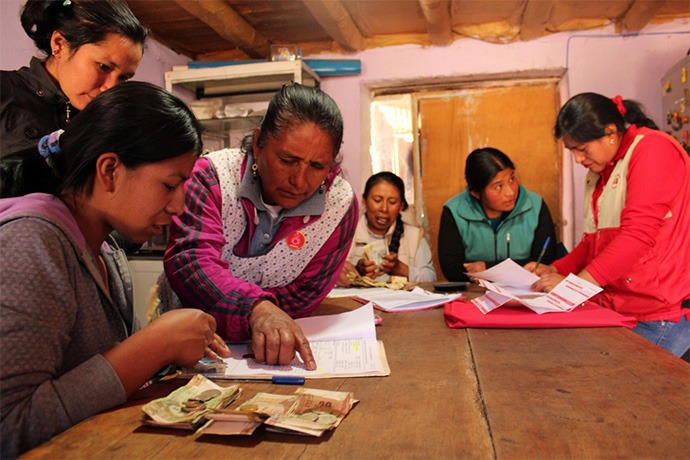
At this village bank meeting in Peru, Pro Mujer staff confer with their clients. Pro Mujer is a development and microfinance institution that issues credit through group-based loans. The organization also provides preventive health education and basic health screening services. Photo courtesy of Global Partnerships.
When economics professor Muhammad Yunus lent $27 to a group of impoverished villagers in Bangladesh in 1974, he ignited a firestorm of excitement in the global development world that would later earn him a Nobel Peace Prize and the title, “Father of Microcredit.” But over the last couple of decades, enthusiasm for microcredit has waned. And although it remains a significant development program, microcredit – and the often used broader term, “microfinance” – is now part of an ever-evolving suite of financial tools designed for the world’s poor.
From the 1980s to the early 2000s, small loans to the world’s poor were heralded as a silver bullet for global poverty. By late 2010, however, international excitement for microcredit had begun to turn critical.
David Roodman – a senior advisor at the Open Philanthropy Project and former senior fellow at the Center for Global Development – wrote in a 2012 opinion piece for the Washington Post that the “proliferation of fast-growing microlenders had made it easy for poor men and women to get in over their heads in hundreds of dollars of debt.” Without credit bureaus to manage over-indebtedness, and with lax banking supervision, some institutions put profits before people, the antithesis of the original vision.
The “zeal for microcredit,” Roodman felt, had blinded many in the industry to the bigger solution – financial services, not just loans, for the poor. These include, for example, savings, insurance and financial literacy classes. “Financial services are like clean water and electricity – they are essential to leading a better life,” says Roodman.
And that’s where the general verdict on microcredit has landed in 2019. Several studies have found fairly consistent “modestly positive, but not transformative, effects.” Although microcredit hasn’t managed to pull millions of people out of poverty, it has – and continues to – play an important part of their everyday lives. Sometimes it’s a safety net for emergencies; sometimes it helps them put food on the table or keep their kids in school; other times it’s the boost they need for a large purchase. Whatever the reason, access to small loans and other financial tools have changed (for the better) how the world’s poor are living from day-to-day.
But development organizations are taking financial inclusion further now, with the hopes that the effects can be truly transformative for the families and businesses of 1.7 billion people around the world who still do not have access to formal financial services. One way organizations are expanding access is through technology.
The Mifos Initiative was born out of the Grameen Foundation when it became apparent that financial empowerment required more than just microcredit. To that end, Mifos launched an open-source platform to help microfinance institutions become “modern and digitally connected providers of financial services to the poor.” But the organization is also working on making sure that digital financial tools are not only available to institutions, but also to end users through an integrated digital payment system.
The introduction of digital payments – mostly through mobile phones – in the developing context has begun to open up many avenues for financial inclusion. Lower transaction costs have made it more viable for banks to serve the poorest of the poor. Digital payments also make it much easier and faster for overseas workers – and aid organizations – to send cash to families in remote areas. Additionally, the ability to audit payment flows digitally can help improve accountability and transparency.
Seeing this and the challenges in financial inclusion at scale, the Bill & Melinda Gates Foundation, through its Financial Services for the Poor program, is expanding the reach of low-cost digital financial services for the poor. Without focusing on a single product or platform, the program works with government and private-sector partners around the world to foster environments that promote the growth of digital financial services and develop systems that work best for each context.
But in many contexts, the poorest of the poor are illiterate and innumerate. This means that in order for them to use digital payments, they need to rely on others for help or they must learn work-arounds that can result in mistakes, such as transferring the wrong amount to the wrong person. The Boma Project has been exploring solutions to those barriers, such as more visually-based tools (e.g. images of cash bills, instead of just numeric values); text-to-speech options; voice recognition for verification and even numeracy training programs.
Mercy Corps is also partnering with Facebook to explore the possibilities of a new global, digital currency as a way to revolutionize financial inclusion. For people living in countries struggling with conflicts, natural disasters and political instability, this new currency – Libra – could offer financial stability as a low-volatility global currency. And as a fully digital currency with low transaction costs, Libra could also make the global cash transfers much cheaper, especially for poor communities that rely heavily on remittances. The blockchain technology on which the currency will be built could also make aid more efficient, transparent, and accountable.
But beyond just giving financially-strapped families better access to financial services, the original vision of microcredit and microfinance was to lift people out of poverty by supporting their microenterprises. Impact investors are now taking that one step further by investing capital in companies and organizations that will generate a positive social or environmental impact along with a financial return.
Global Partnerships uses the term “impact-first investing” to describe how it prioritizes the “highest possible social impact, while seeking to preserve capital with a modest financial return for investors.” The organization uses philanthropic capital to invest in social enterprises in Latin America, the Caribbean, and sub-Saharan Africa that deliver products and services to empower people living in poverty to improve their lives. As of March 2019, Global Partnerships has invested in 135 cumulative social enterprises.
Similarly, large global investment firms like Capria are also supporting positive social and environmental change through impact investments. Capria runs a network of fund managers who back early-growth businesses in emerging markets. Currently, the Capria Network includes 16 fund managers, investing in 37 countries in Africa and the Middle East, South and Southeast Asia, and Latin America. In addition, members of the Capria Network share knowledge and connections with each other to maximize impact, reach and best practices.
But others like Einstein Rising in Africa and Upaya in India take a more hands-on approach with the entrepreneurs they support. Both organizations offer accelerator programs to help entrepreneurs fully develop their companies, then offer investment to select participants. Not only do these businesses improve the lives of the entrepreneurs, they also create thousands of jobs for those on the margins of society.
And that’s exactly the founding idea of microcredit – that a small amount of money can have a compounding positive impact on the life of someone living in poverty. Although the promises of microcredit haven’t panned out exactly as Muhammad Yunus envisioned, they have inspired the development of a host of innovative financial inclusion tools and social enterprise strategies. With all these ideas combined, perhaps one day everyone can emerge from the shadow of poverty.
# # #
The following Global Washington members are working to increase access to financial services and income-generating activities in some of the poorest parts of the world.
3rd Creek Foundation
3rd Creek Foundation is a private family foundation focused on global poverty alleviation through grant-making and impact investing. More specifically, the foundation supports early stage programs that create sustained economic opportunity and dignity for the ultra poor.
Awamaki
Awamaki teaches women’s artisan cooperatives in the rural Andes how to start and run their own businesses, connecting the cooperatives to markets and providing training in product development and business management. They create alpaca accessories, woven bags, and home goods. Awamaki supports 180 artisans who are lifting their families out of poverty.
Bill & Melinda Gates Foundation
The Bill & Melinda Gates Foundation’s Financial Services for the Poor program aims to play a catalytic role in broadening the reach of robust, open, and low-cost digital payment systems, particularly in poor and rural areas—and expanding the range of services available on these platforms.
Capria
Capria is a global impact investment firm managing multiple funds that accelerate the flow of capital to deliver superior returns in emerging markets.
Dalberg
Dalberg is a global group working to build a more inclusive and sustainable world where all people, everywhere, can reach their fullest potential.
Einstein Rising
Einstein Rising empowers Africa’s social entrepreneurs through its SME business development curriculum and provides access to startup capital. These wealth creators develop for-profit companies that tackle entrenched social and environmental issues without sacrificing the financial bottom line.
Global Partnerships
Global Partnerships is an impact-first investor, dedicated to expanding opportunity for people living in poverty. For 25 years GP has invested in sustainable solutions that help impoverished people increase their incomes and improve their lives, with core investments in livelihoods, education, health, energy, housing, and sanitation.
Grameen Foundation
Grameen Foundation is a global nonprofit that empowers the poor, especially women, to end poverty and hunger. It creates breakthrough solutions – spanning financial, agricultural and health services – that leverage digital technology and local partner networks to bring people the tools and opportunities they need to help themselves.
Initiative for Global Development
The Initiative for Global Development (IGD) engages and harnesses the power of the private sector to create sustainable growth and alleviate poverty in Africa.
Largesse
Largesse is a mission-driven business that specializes in curating beautifully presented handmade, eco-conscious and/or fairly-traded corporate gifts. Largesse helps corporate gift buyers find unique solutions for executive gifts, incentive rewards and promotional products that align with and reinforce their brand values. Largesse’s mission is to create sustainable economic opportunities for marginalized and talented artisans across the world by giving them equal access to the global marketplace of corporate buyers.
Mercy Corps
In times of crisis, Mercy Corps supports people who lack access to financial resources with cash assistance. Last year, Mercy Corps connected more than 1.1 million people (191,000 families) to cash during emergencies, infusing more than $32 million into local economies around the world.
Mifos Initiative
The Mifos Initiative provides education, training, and tools to enable charitable organizations and social enterprises to make financial inclusion more affordable, available, and accessible to the 2.5 billion unbanked poor in the world.
Oikocredit US
Oikocredit is a worldwide financial cooperative that promotes global justice by empowering disadvantaged people with credit.
Path from Poverty
Path From Poverty reaches across cultures to transform lives and communities by partnering with women’s groups; empowering and equipping women to break the cycle of poverty and live into their God-given potential, irrespective of their spiritual beliefs.
Upaya Social Ventures
Upaya’s mission is to create dignified jobs for the poorest of the poor by investing in small businesses in India’s poorest communities. Upaya creates dignified jobs for the poorest of the poor by building scalable businesses with investment and consulting support.
Back to Top
Organization Profile
A Different Kind of Capitalism: Einstein Rising Lifts Up African Social Entrepreneurs
By Amber Cortes
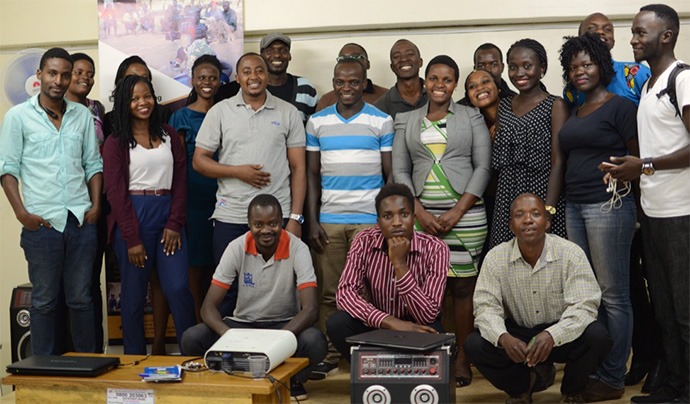
Einstein Rising’s final accelerator cohort of 2018. Photo provided by Einstein Rising.
Einstein Rising is shifting the philanthropic status quo to Africa beyond aid. An ambitious goal, to be sure, but then again, supporting ambitions is what this organization does best.
A Ugandan-based business accelerator for social entrepreneurs, Einstein Rising embraces African solutions to African problems. The founder, Alexis Chavez, developed an approach with her team that focuses on wealth creation with many positive ripple effects on entrenched issues.
Set Up to Succeed
Since 2009 Chavez has worked throughout Africa, starting off in wildlife rescue, then in conservation through humanitarian aid. But she couldn’t shake the feeling that the existing aid mechanisms alone could not combat the root cause of these problems—poverty.
Chavez was living in Bwindi, a UNESCO world heritage site in Uganda, near the border of Rwanda and Congo. It is home to about half the world’s endangered mountain gorillas. “And this is where I started to see the big problem,” she says.
“The NGOs are there, trying to preserve the mountain gorillas, trying to help communities so they, too, will preserve the mountain gorillas. And, as you walk down the street there, it’s—failed aid project, failed aid project, failed aid project.”
The project Chavez ran for a U.S.-based NGO was no different. “People often find my criticism of the traditional aid model quite abrasive,” Chavez says. “Saying, ‘But we were only trying to help,’ from thousands of miles away seems like a reasonable reaction. But on the ground in Africa, it’s people’s lives.”
Chavez expresses frustration with aid models that solely employ direct assistance (donated goods and cash grants or vouchers) or micro-lending to alleviate poverty.
“For us, we don’t want to put a Band-Aid on the situation. I think everyone is exhausted from firefighting these entrenched issues. So, how do we get in front of them? We find the people that know how to solve the problems.”
Isaac is a recent Einstein Rising accelerator graduate whose company sells household toilets (as opposed to communal trench toilets, which can harbor disease and contaminate ground water). The company hauls the waste away and converts it into fertilizer pellets. “I’ve knocked on more organizations’ doorsteps then I can count,” Isasc told Einstein Rising. “They all told me ‘nice idea but we cannot help you.’”
Einstein Rising rose to the challenge, and recently invested $5,000 in Isaac’s company.
A Space to Invest In
Uganda has the largest population of young people in the world—77% of its population is under the age of 30. In 2015, the World Economic Forum ranked Uganda as the world’s most entrepreneurial country, clocking in almost 30% of business-owning adults. But it’s tough for these start-ups to survive. According to a 2014 report from the Global Entrepreneurship Monitor, the biggest challenge that entrepreneurs in Africa face is access to capital.
“Coming in as a business accelerator was really ideal,” Chavez explains, “there are no jobs but there’s also no shortage of young people with impactful ideas. But they need guidance and they need capital.”
Here’s how Einstein Rising works. Entrepreneurs apply to be part of an accelerator program. It is a no-cost model, which provides a three-month business development curriculum. Throughout the process, Einstein Rising offers intensive mentorship, coaching, education, and finance tools, as well as marketing advice — all with the goal of creating long-term value for investors, entrepreneurs, the community, and the environment. After completing the program, entrepreneurs participate in a pitch day where individuals—and NGO’s—can decide whether to fund their vision. After the Einstein Rising board reviews the pitches, the best performing companies receive startup capital investment of between $2,500 and $10,000. Einstein Rising recoups its investments by receiving a 10% dividend on the annual profits of the investments. The goal is complete self-sufficiency.
Africa has countless investment opportunities, Chavez says, yet venture capital needs to be redirected towards SMEs—small to medium enterprises. This is also where financial support can be transferred from traditional aid models. These types of companies require “patient capital,” as they generally have slower returns, but they make up the majority of the African investment sector. This, Chavez says, is where Einstein Rising sees opportunity.
A Different Kind of ROI
At Einstein Rising, success is measured not just by dollars, but by impact and innovation—how a business gives back to its employees, community, and the environment, as well as how a particular problem is tackled.
The businesses that Einstein Rising develops hail from a range of social and environmental justice work: street kids earning a living through recycling, farmers addressing food waste, disadvantaged youth & refugees becoming freelance video producers and film editors.
Almost every company has a unique idea or strategy, and to be considered for investment, the idea must be scalable and replicable. Financial growth, however, doesn’t have to come at a high cost for both people and the planet. For Einstein Rising companies, the more impact they make, the more profitable they become.
Socially conscious capitalism, also known as ‘ethically-grounded free enterprise,’ rests on guiding principles other than just answering to stakeholders, such as cultivating ethical leadership and respecting culture and the environment. Conscious capitalism accepts that most of the world is operating under a powerful economic system, but decides that dollars alone do not have to drive decisions.
The Entrepreneur Revolution
“From the top down, change isn’t happening.” Chavez says. “Or at least, not at a good rate anyway. So how do we do bottom-up change? How do we shift?”
Einstein Rising now has about 125 entrepreneurs going through its accelerator program every year, and has affected over 10,000 people, through direct and indirect impact, over the last few years. The organization is also growing through dozens of partnerships, like the Impact Hub co-working space in Kampala, and with Muhammad Yunus’s microfinancing institution, Grameen Bank. More recently, Einstein Rising is working with Africa’s 4th-ranked Makerere University to run its brand-new entrepreneurship innovation center.
“If we work with social entrepreneurship, and we’re putting people in positions of power who really care about their environment and their community, for us it’s this whole idea of the entrepreneurial revolution, and creating a system, sort of reallocating power.”
The network has already expanded. For every company developed, each entrepreneur creates jobs and impacts lives. This chain reaction has allow Einstein Rising to affect the lives of over 10,000 people within the last four years.
And if the entrepreneurs of the future have a strong sense of social responsibility, Chavez says, “then it’s a really good place to be.”
Back to Top
Goalmaker
“The Advancer” Takes Impact to the Next Level
By Amber Cortes
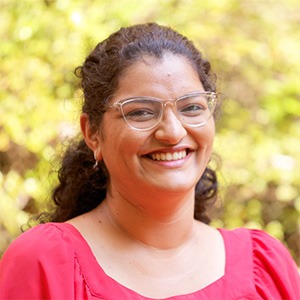 “The Advancer.” It sounds like the code name for a spy in an epic thriller blockbuster film—someone who brings all the mystery and intrigue to the plot. But instead, Uma Sekar solves mysteries—bringing rigorous datasets, illuminating metrics, and evaluative savvy to her role as “The Advancer” for global investment firm, Capria. Sekar develops and manages Capria’s impact strategy—helping fund managers and companies decipher the puzzles of how to make money by being sustainable, and making the world a better place.
“The Advancer.” It sounds like the code name for a spy in an epic thriller blockbuster film—someone who brings all the mystery and intrigue to the plot. But instead, Uma Sekar solves mysteries—bringing rigorous datasets, illuminating metrics, and evaluative savvy to her role as “The Advancer” for global investment firm, Capria. Sekar develops and manages Capria’s impact strategy—helping fund managers and companies decipher the puzzles of how to make money by being sustainable, and making the world a better place.
“We recently changed the title,” she explains. “It always used to be “The Evaluator.” But it’s not just about creating evaluation methods, but actually doing something with them!”
Her official title at Capria is Director of Impact and Fund Manager Advancement, but “The Advancer” just sounds so much more fun. Capria’s model of impact investing is a little different than most—instead of investing directly in companies across the world, Sekar explains, Capria’s network fund identifies fund managers who know their communities and understand the challenges of the local market, “and supports them so that they can make really smart investments that succeed in the long term.”
“My role has been to support them on that journey,” Sekar says, “all the way from defining what their impact thesis is and figuring out what types of investments they’re going to make with an impact lens, to choosing the right company. And once you make the investment, supporting those companies to manage for impact.”
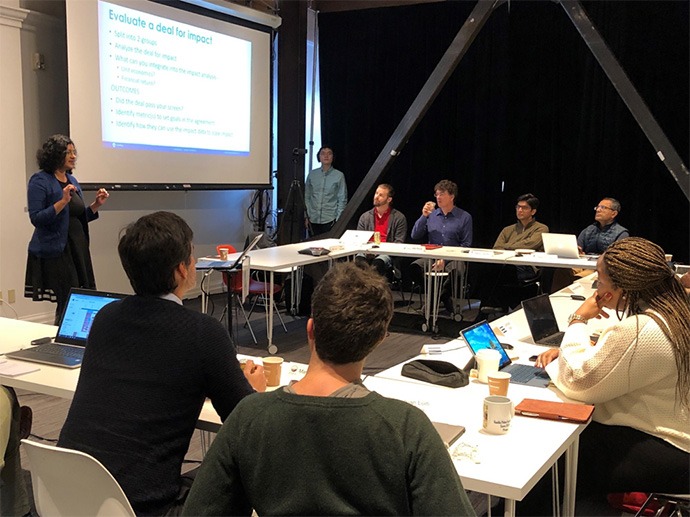
At a group training in Seattle, Uma Sekar trains a group of fund managers on how to evaluate a deal for impact. Photo provided by Sekar.
Sekar helped build out the impact strategy for one of the members of the Capria Network, Unitus Ventures (formerly United Seed Fund), a venture impact fund in India that supports tech-enabled startups working in the healthcare, education, jobs, and finance sectors. At Unitus Ventures, Sekar has collaborated with over thirty CEOs to implement impact management strategies into their business plans.
Capria’s support could mean anything from helping CEOs align their vision with their impact strategy, evaluating best practices for operational support, and collecting the right data to help companies secure more customers and growth capital.
While this may sound like part of the course of any smart business strategy, what makes Sekar’s job unique is advancing the ethical, positive impacts and managing for negative risks of a company. For example, part of her role involves developing Environmental, Social, and Governance (ESG) frameworks for sustainable and responsible investing. ESG performance thresholds help determine how well a company will perform in the long run. But in some cases, finding methods for measuring these kinds of impacts are not always as clear cut as with other bottom-line ROIs.
For example, how do you quantify something like trust? That was the challenge facing Sekar when she worked with one company that wanted to become the “Uber of toktoks.” You may have seen them if you’ve ever been to India—those little human-powered passenger carts called rickshaws, known locally as “toktoks.”
“One of the key issues in terms of impact in my discussion with the CEO, the core reason behind starting this business, was to make sure that people trusted auto rickshaw drivers.” Sekar explains, “and measuring something like this is really hard—there are no explicit metrics for it. And you can’t really develop a psychometric profile on the drivers.”
So instead, they decided to track the number of police complaints on the drivers in the platform from local precincts to see if those were reducing over time. And they also got a customer feedback mechanism built into the app.
“That’s an example of something that’s highly qualitative,” Sekar says. “It’s cultural change that needs to happen and we had to find a way to quantify it, set it into motion, and see how it progressed over time.”
Connecting the CEO’s long-term vision for the company’s impact—to build trust—with their goals of being a successful business, is what an ‘impact strategy’ is about, and it’s a win-win for everybody.
“Their impact strategy is built into how they’re thinking about the business from the beginning. And then it’s identifying metrics that will add enhanced value over time. He knew that if he can solve the trust problem, then more customers will use the app!”
You could say Sekar and Capria are navigating new waters—impact investing is a field that has only been around for the last twelve years. Eventually, Sekar wants to see an ecosystem where prioritizing social and environmental impact is “no longer unique—it’s embedded in what everyone does.” She doesn’t think it’s going to happen in five years, or 10 years. But she does think the right steps are being taken.
Some of these steps include standardizing best practices for impact evaluation and management. Sekar points to a few examples: a set of operating principles developed by the IFC/World Bank, the five dimensions of impact developed by the Impact Management Project, and a study by the Global Impact Investing Network, Core Characteristics of Impact Investing. All of these, Sekar says, add clarity and consistency to an emerging field.
Though the United Nation’s Sustainable Development Goals have provided a set of global goals for impact-aligned institutions to align with, Sekar says that we need to have “a better mechanism of measuring towards those SDGs. It would be great if we knew everyone who’s in the impact investing industry, how everyone’s contributing towards some of those goals; which goals are not being achieved, and where to move capital.”
The impact investing space is growing—according to the Global Impact Investing Network’s Sizing the Impact Investing Market report, the market for global impact investing is now $502 billion. Sekar sees this future as bright, and likes to tap into the next generation of thinkers and doers through her work with Capria, and through her volunteer endeavors with organizations like Young Women Empowered in Seattle.
“I think it’s a very interesting juncture,” Sekar says. “And I think the generational shift is leading that to some extent; with more millennials who want social and environmental impact to be at the core of every business. And we want to put money behind that.”
Back to Top
From Our Blog
Microcredit Can Be a Life-Changer – But It Isn’t for Everyone
By Heather Targosz, Marketing & Communications Manager, Upaya

Employees sort waste at a Saahas Waste Management facility outside Bangalore, India. Photo courtesy of Upaya Social Ventures.
One person in every 10 is living in extreme poverty today, earning less than $1.90 per day. This figure has dropped significantly from 35% in 1990, but the issue remains a top priority of the UN Sustainable Development Goals (SDGs). Eradicating poverty (SDG 1) means finding more innovative, cost effective and scalable ways of reaching the last 10%.
Arguably, one of the more effective solutions to alleviating poverty in the past several decades has been microcredit, in which very small loans are extended to impoverished individuals. Microcredit has proven extremely effective in helping individuals, oftentimes women, become entrepreneurs. Given a microloan, a woman might be able to open a fruit stall at the market or sell handcrafted jewelry out of her home. When used properly, the potential of microcredit is remarkable and life-changing for those in poverty. But not everyone is a fit for microcredit.
Read More
Back to Top
Welcome New Members
Please welcome our newest Global Washington members. Take a moment to familiarize yourself with their work and consider opportunities for support and collaboration!
A Child’s Notebook
All children deserve a quality education. A Child’s Notebook partners with local communities and invests in the lives of children in Southeast Asia. achildsnotebook.org
Andrew W. Lyon Travel
Andrew W. Lyon Travel elevates its clients’ travel experience by organizing group logistics, crafting unique experiences, and connecting them to the world. www.andrewwlyon.com
Back to Top
Member Events
September 14: The Rose International Fund for Children // Annual Fundraiser
September 24: World Affairs Council // Giving Meaning to “Never Again”: Preventing Genocide and Crimes Against Humanity
October 6-8: Asheshi // Deep Dive
October 11: Agros // Tierras de Vida
October 22: The Max Foundation // Maximize Life Gala
October 24: Sahar // Annual Fundraiser
November 21: BuildOn // Gala
Back to Top
Career Center
Manager, Global Programs, UW Foster School of Business
Development and Operations Coordinator, Splash
Permanent Supportive Housing Advocate, YWCA of Seattle-King-Snohomish County
Check out the GlobalWA Job Board for the latest openings.
Back to Top
GlobalWA Events
September 13: A Conversation with Feminist Rukhshanda Naz from Pakistan
November 15: GlobalWA Goalmakers Conference
Back to Top
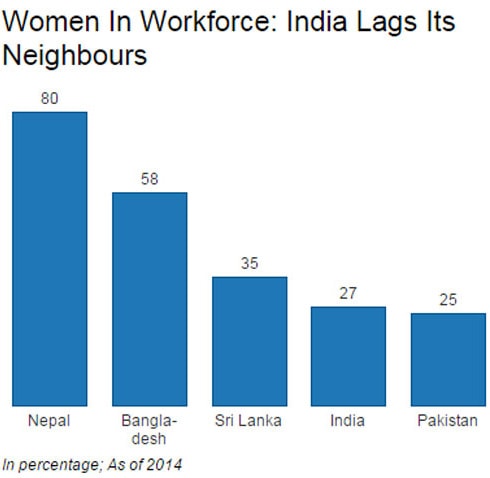
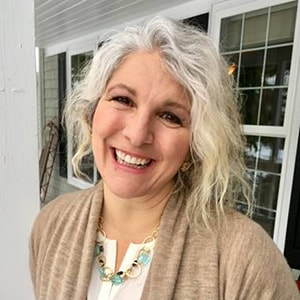





 Growing up, Pierre Ferrari felt like he was living two lives.
Growing up, Pierre Ferrari felt like he was living two lives.









 “The Advancer.” It sounds like the code name for a spy in an epic thriller blockbuster film—someone who brings all the mystery and intrigue to the plot. But instead, Uma Sekar solves mysteries—bringing rigorous datasets, illuminating metrics, and evaluative savvy to her role as “The Advancer” for global investment firm,
“The Advancer.” It sounds like the code name for a spy in an epic thriller blockbuster film—someone who brings all the mystery and intrigue to the plot. But instead, Uma Sekar solves mysteries—bringing rigorous datasets, illuminating metrics, and evaluative savvy to her role as “The Advancer” for global investment firm, 

